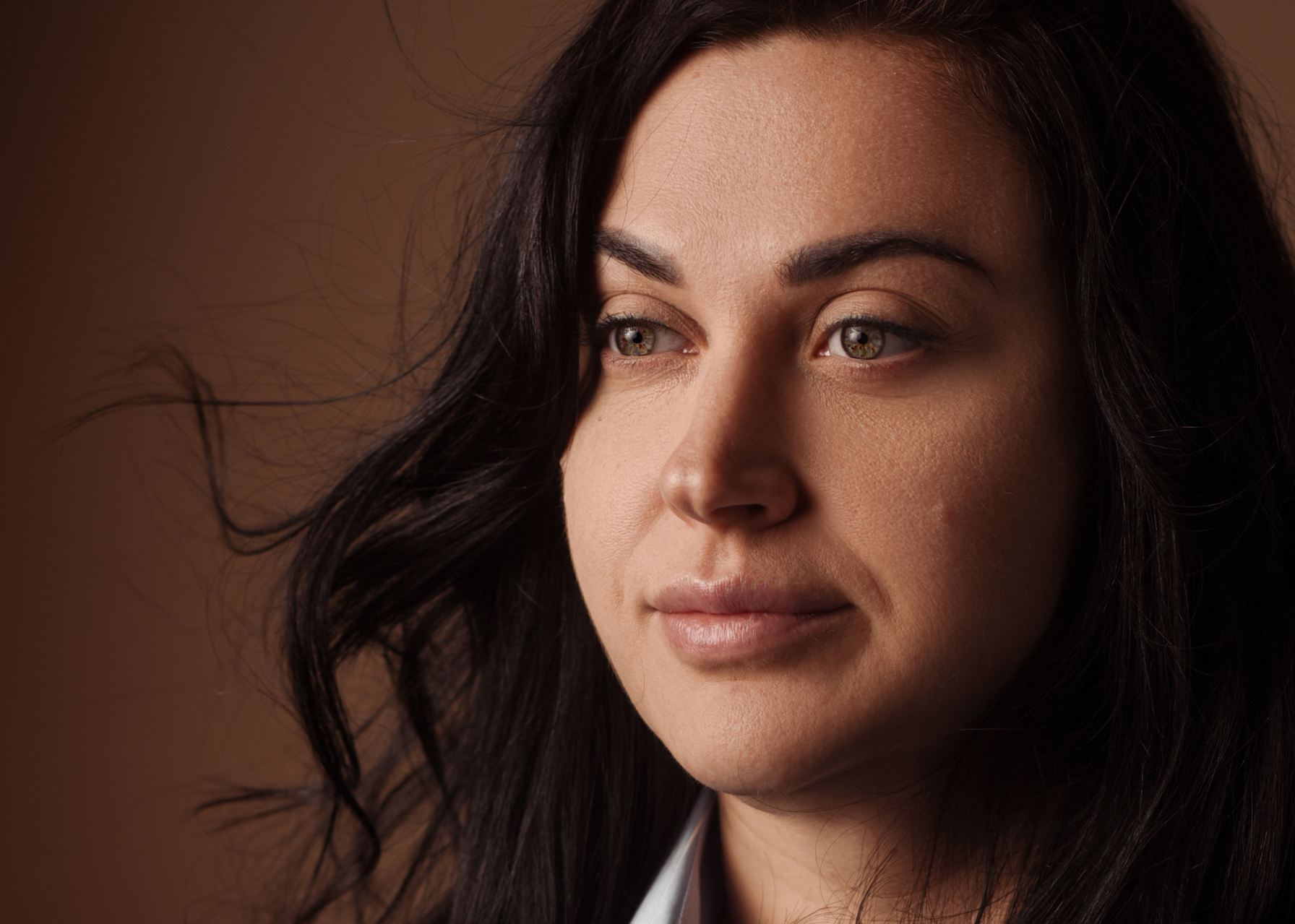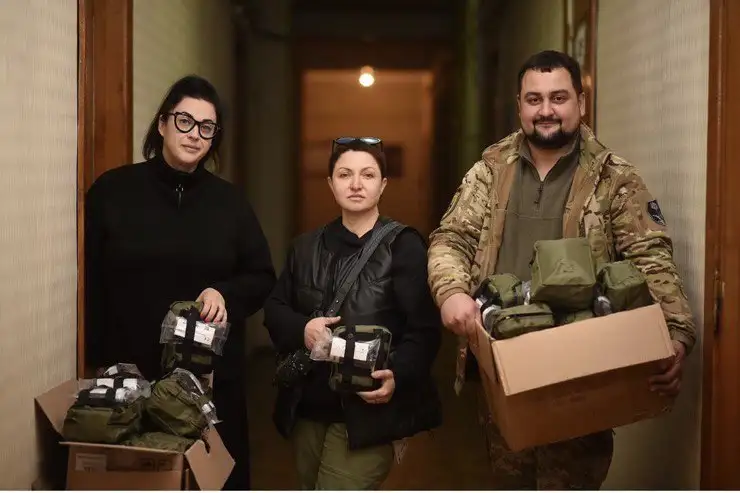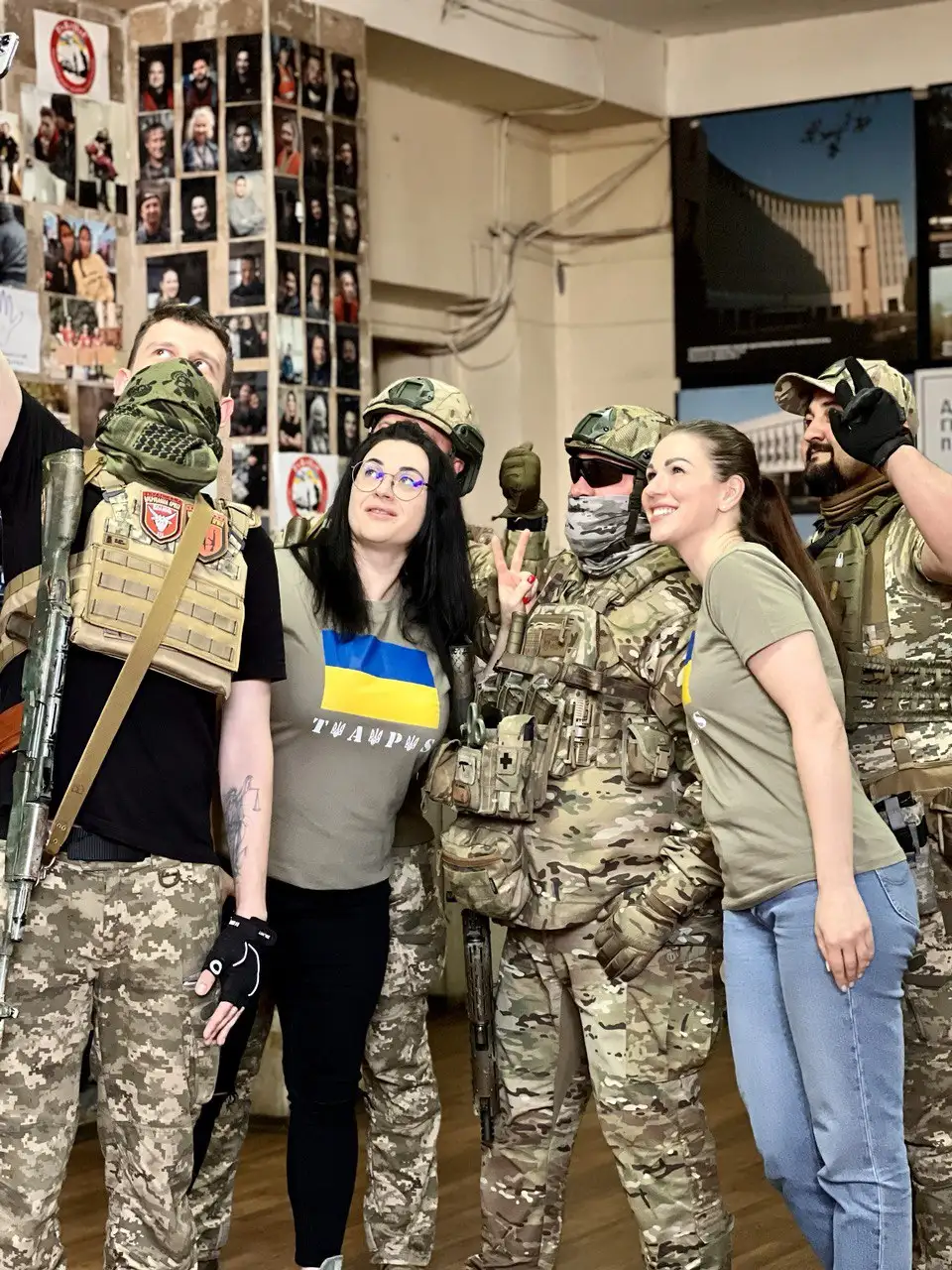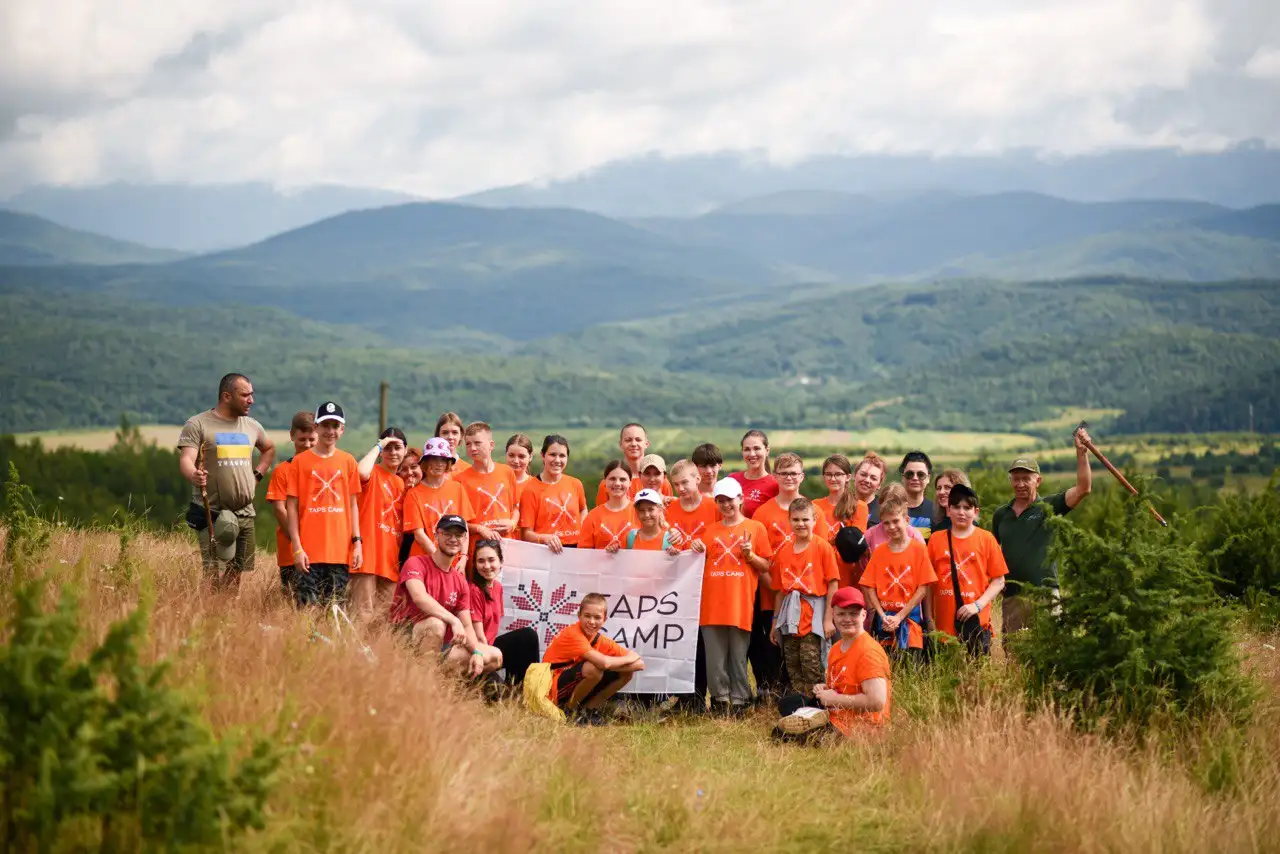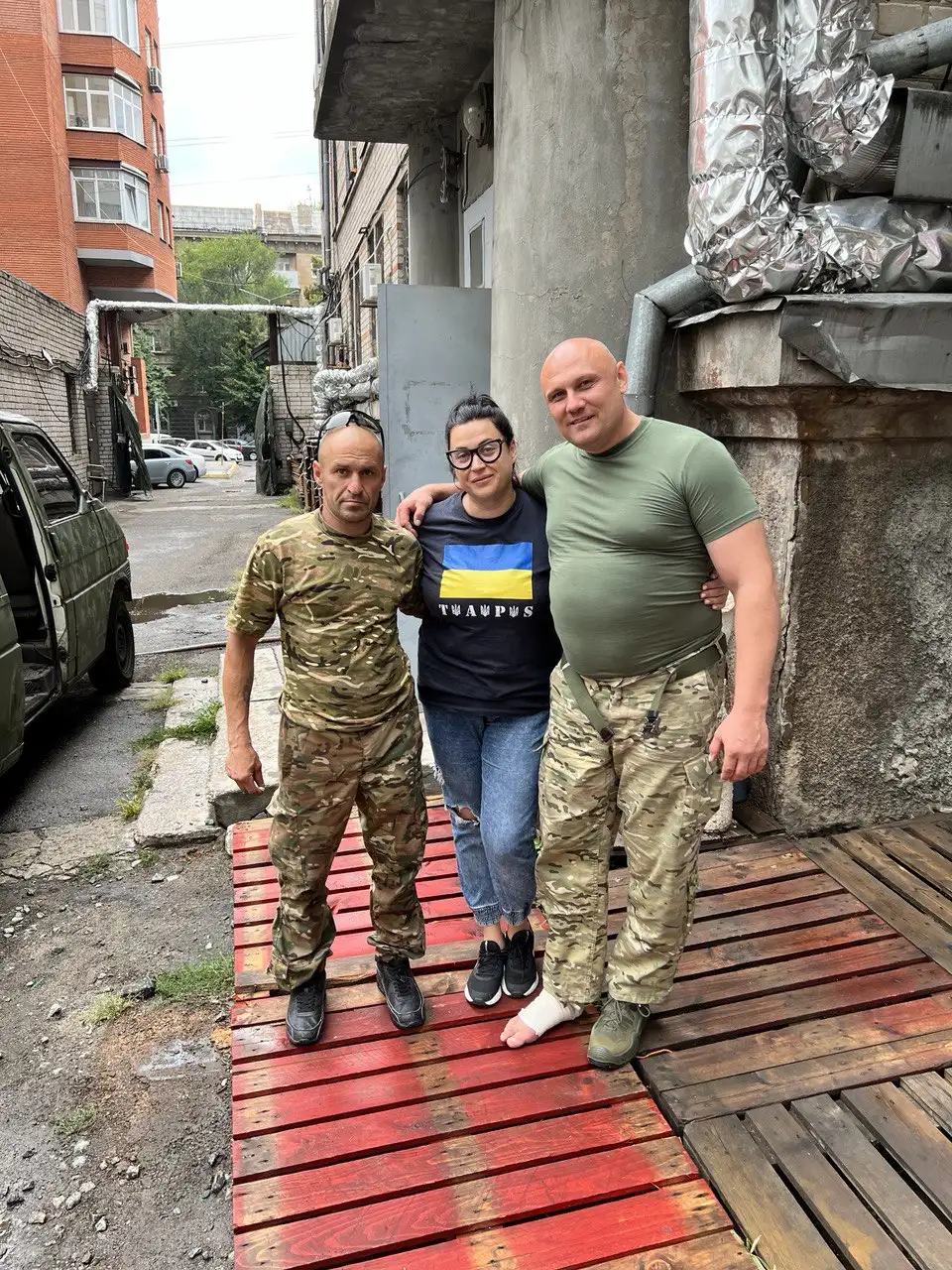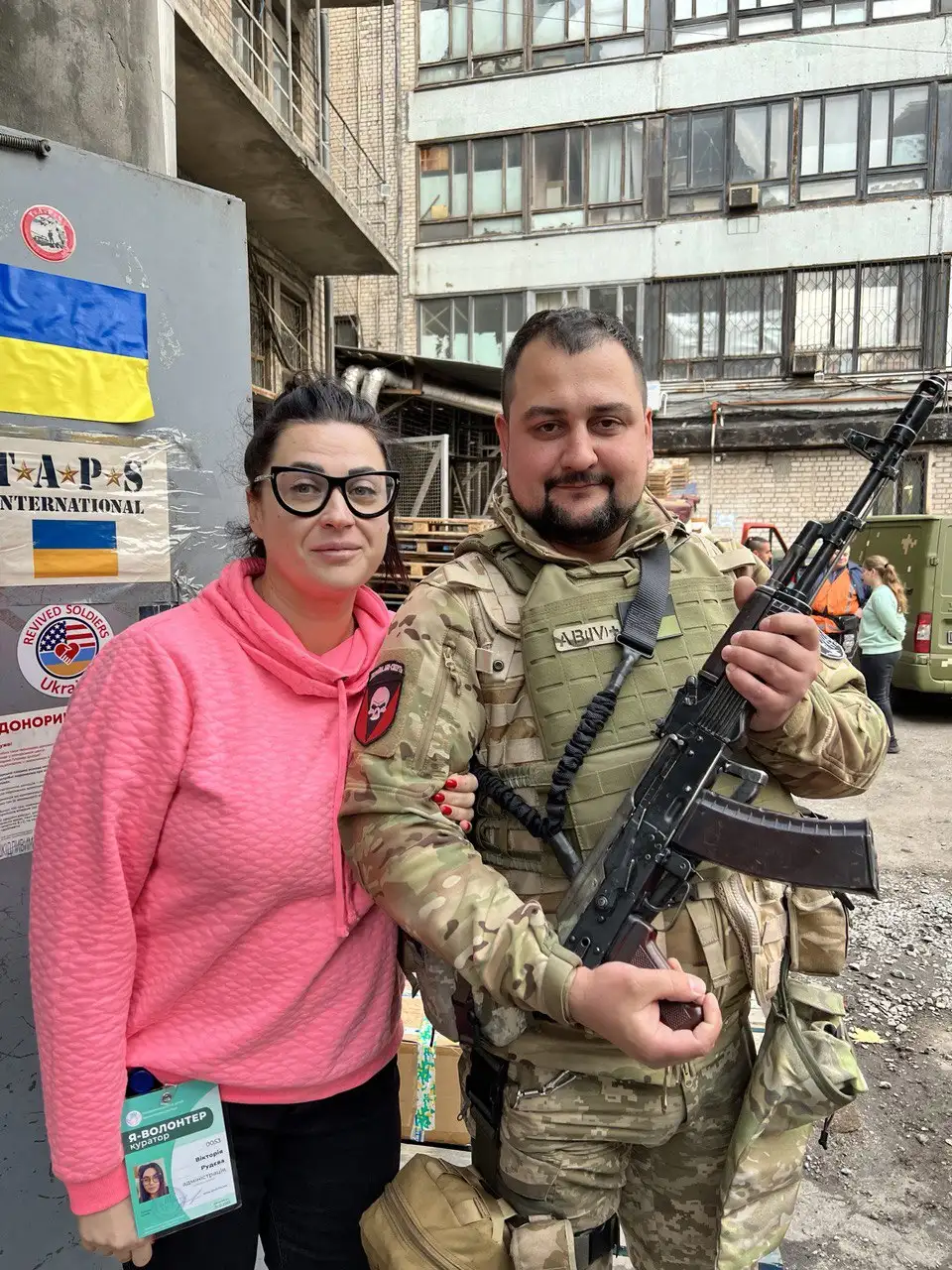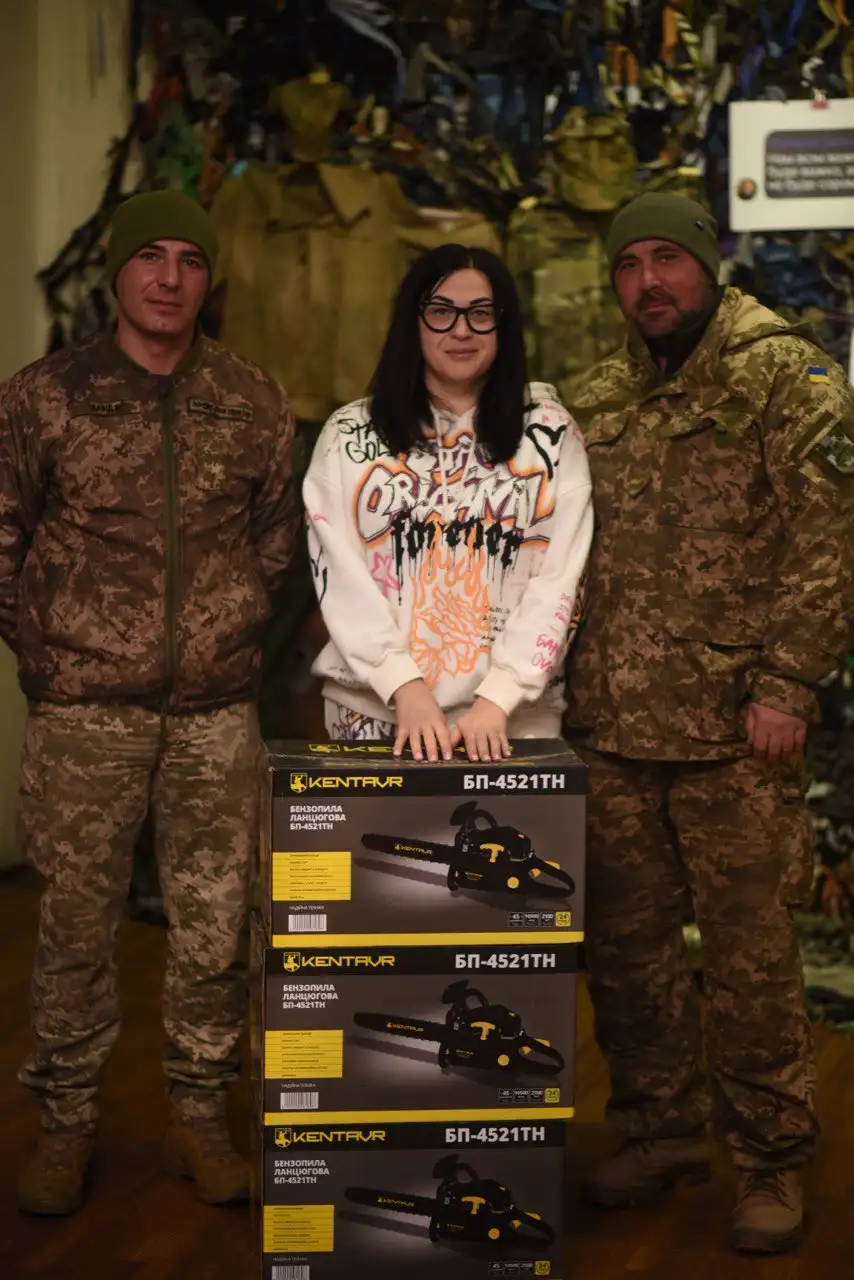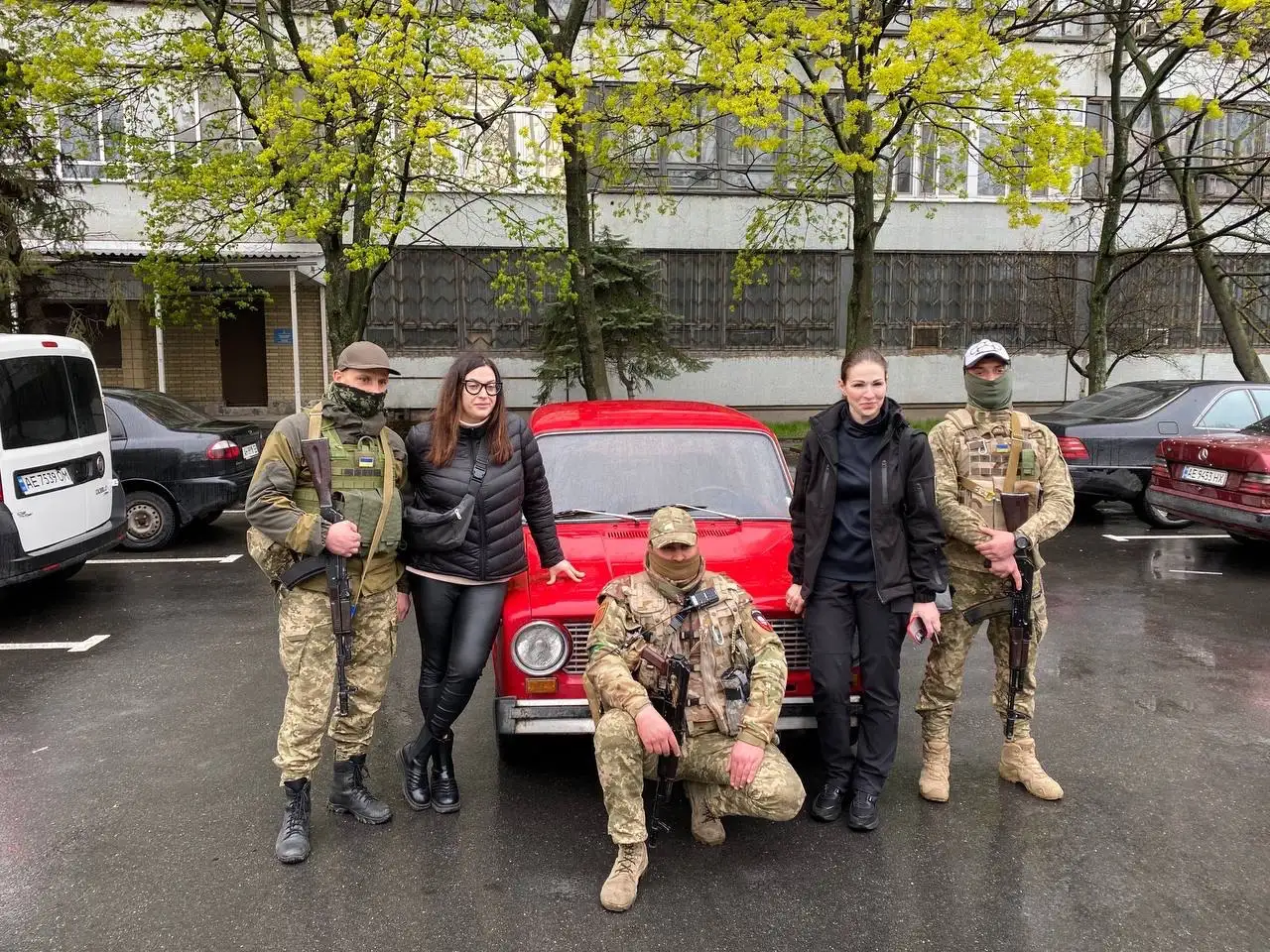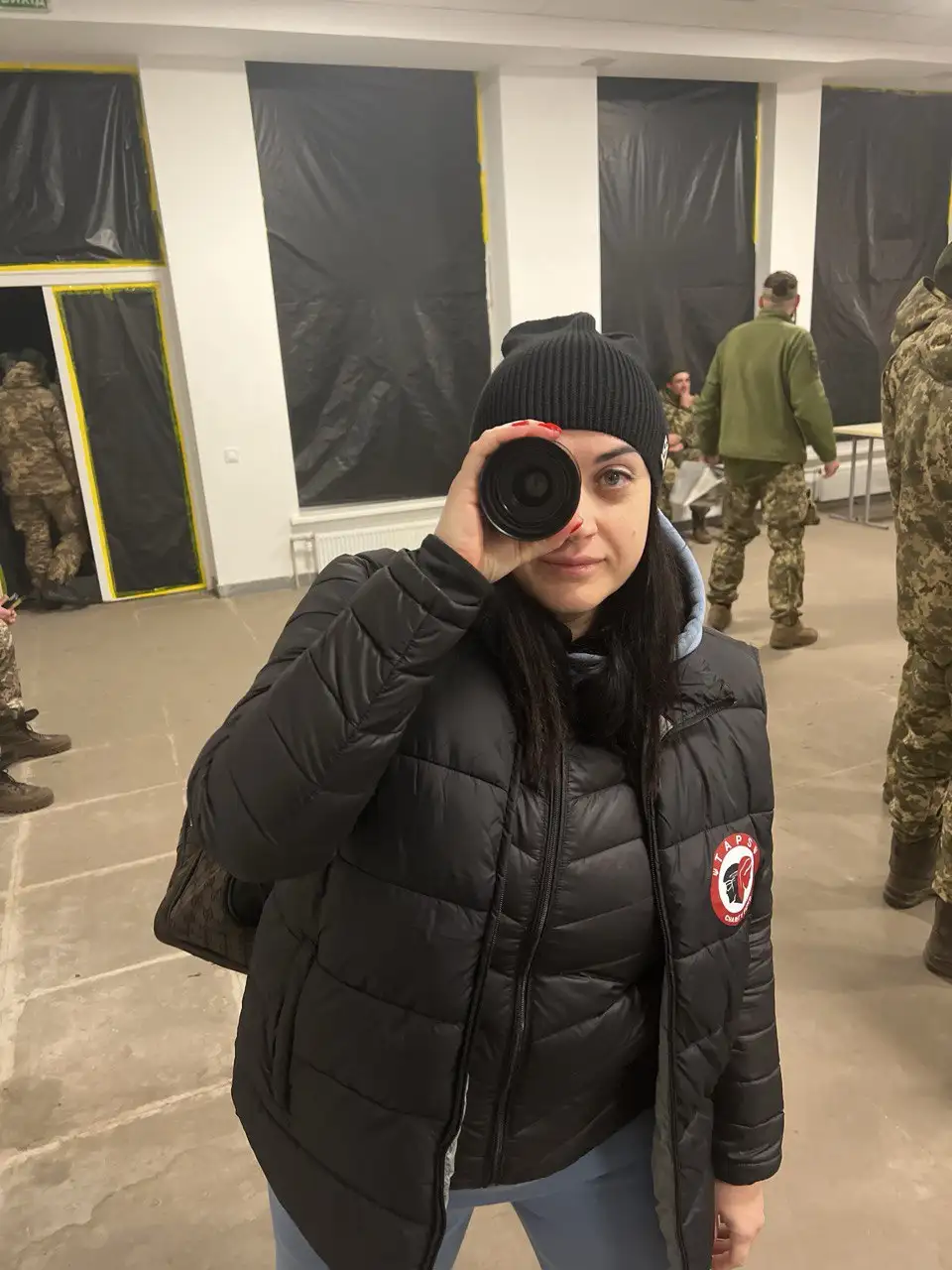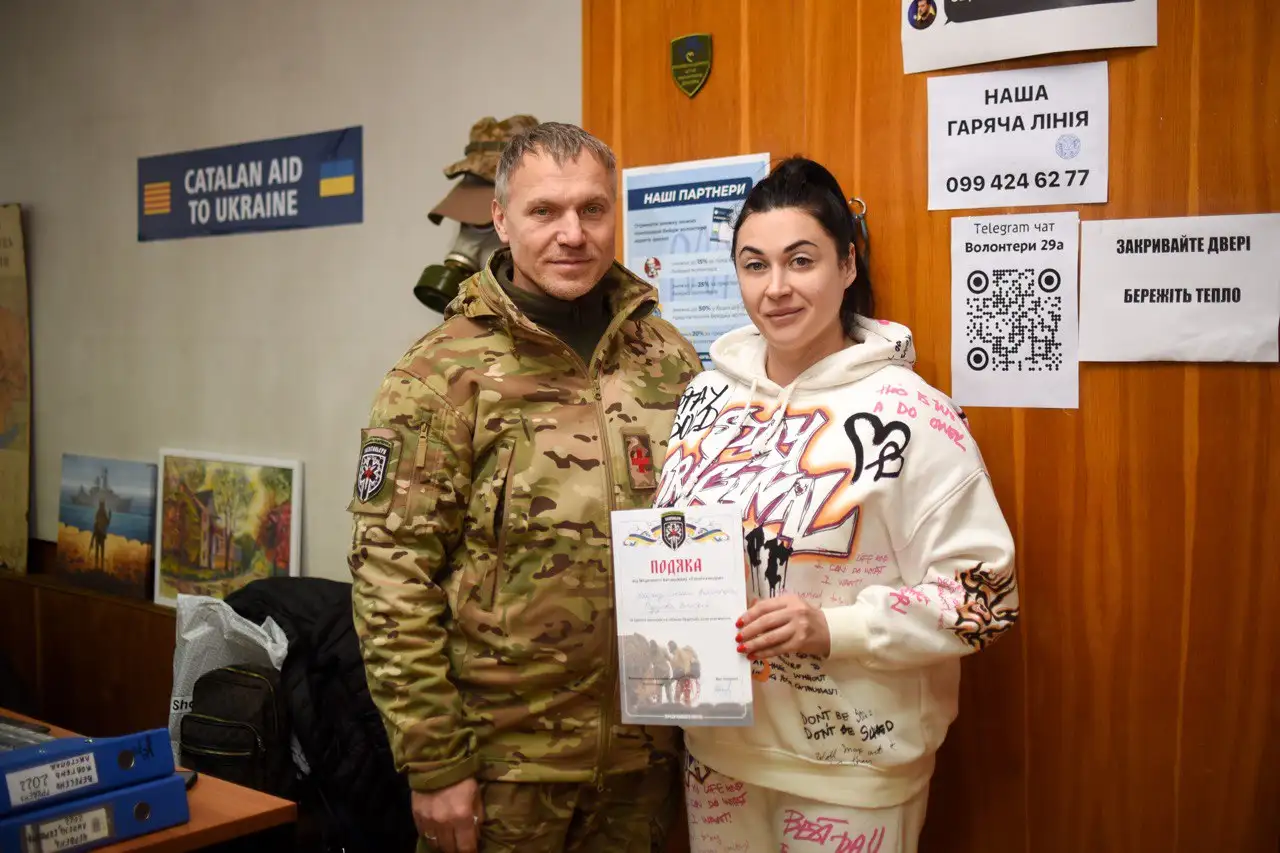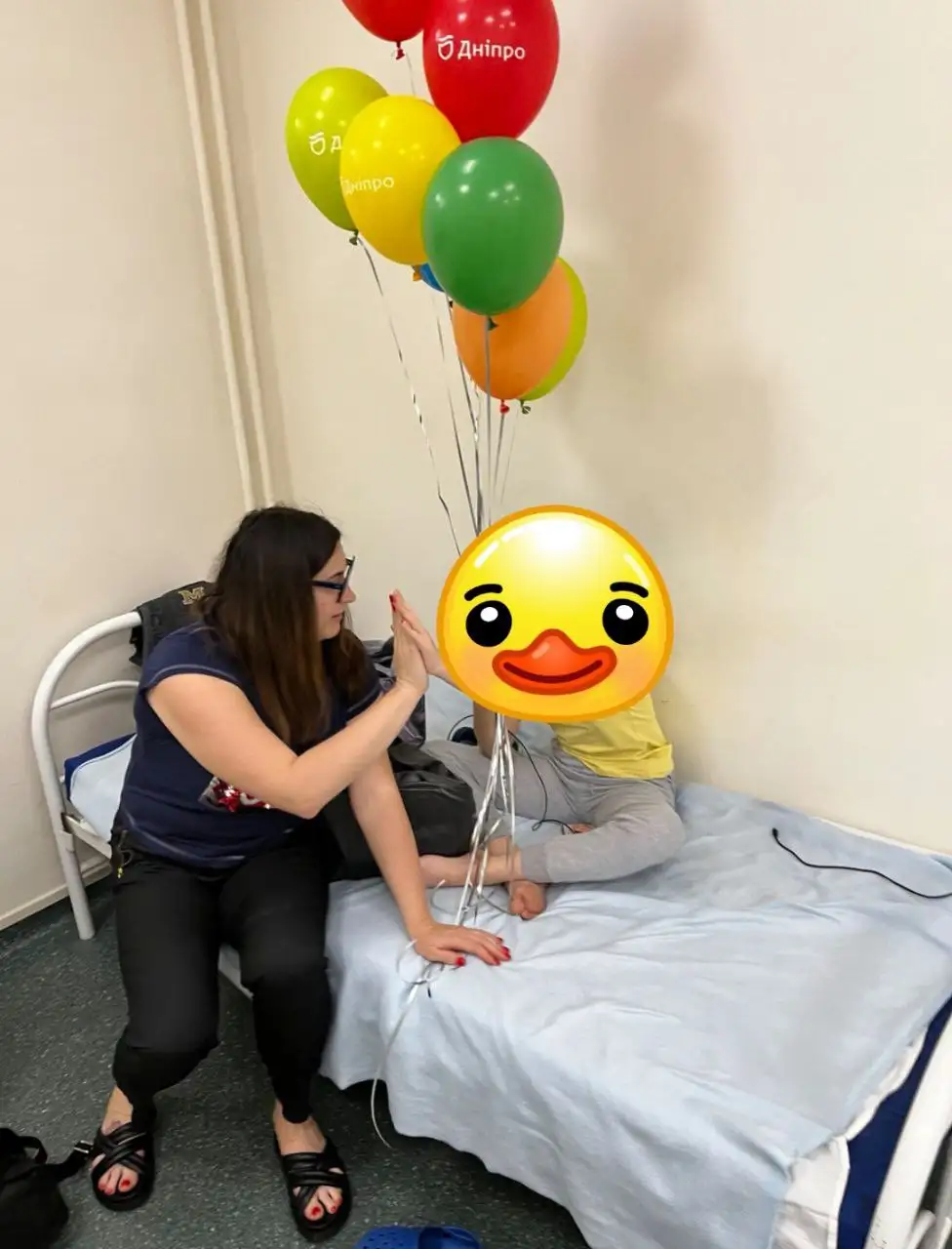“My first volunteering experience was in childhood, when I visited an orphanage with a school theater performance I was part of—I was 9 years old at the time. My family taught me to help those who cannot help themselves. It’s normal: if you have the resources, you support people without expecting anything in return. Supporting the military is different—it’s about contributing to your own safety. Ukrainians must all understand this: if we support the army, the soldiers will be more motivated and determined to defend us. Since most of my early volunteering was with children, now at TAPS I organize different activities for the families of our Heroes: walks, picnics, concerts, and support for children and youth.”
1) How did your volunteering path begin before the war, and how did it change after the invasion?
My first volunteering experience was in childhood, when I visited an orphanage with a school theater performance I was part of—I was 9 years old at the time. It was the 1990s, times were hard for everyone, and I will never forget the reaction of the children to the small gifts we brought. My family played a huge role in this, teaching me to help those who cannot help themselves. It was I who asked my parents to buy things for the children that the caregivers could not afford. Later, our whole family took care of that orphanage. There was no publicity then, and our only goal was to bring a little joy to those who lacked it.
My great-grandmother once hid a soldier from the Germans during World War II at the risk of punishment. They threatened her, but she never gave him away. Many years later, he found her to say thank you. That too is a kind of volunteering… True volunteering is not self-sacrifice at the cost of your own time—it’s confidence in a goal, a path toward victory and the triumph of good.
As an adult, my friend Olena (an actress) and I actively supported children in the oncology ward of the Dnipropetrovsk Regional Children’s Hospital. The first time I went there, I didn’t know how I would react to what I’d see. My friend warned me not to cry. And I held back. Instead of tears, I used my humor, which people enjoy. Later, we collected and delivered aid and entertainers, and painted the department with bright colors, creating a fairy-tale atmosphere. Unfortunately, I also have a story of loss there. I met nine-year-old Vitaliy Khomenko twice and helped his parents when they couldn’t afford chemotherapy. Time passed, I believed he would gradually beat the disease, but when I called my friend, she told me no more fundraising was needed—Vitaliy was gone.
Now, during the war, we help provide for children brought to Dnipro from combat zones whose parents are missing. These are “children without status,” and unfortunately, until their parents are found or the war ends, they will remain in hospitals. They cannot be adopted. We visited them on St. Nicholas Day, bringing gifts and sweets.
I sometimes think that if these children remain without parents, perhaps they could find new homes with families who lost their own children in the war. At TAPS, there’s such a story—a family that lost their son on the front has now adopted children from an orphanage.
Perhaps my care for children transitioned into my attitude toward the military. They call me “the mother of UDA,” and my protégés “Rudev’s kids.” When the invasion began, the first person to contact me at the headquarters was Roma from the Ukrainian Volunteer Army, call sign “Bald.” From then on, he directed everyone to me: “Look for Vika in glasses.”
2) Tell us about your work with military requests: how do you find what’s needed, and what’s the strangest thing you’ve been asked for?
Of course, the hardest and most expensive items are vehicles, ATVs, and drones, but the strangest was when soldiers requested tripods like those used by surveyors. Once, a pensioner came and donated a car—an old red Zhiguli—for the soldiers. When we handed it over, we all laughed at the color.
For large-scale assistance, we’ve provided ambulances, ATVs, drones, generators, power stations, chainsaws, camouflage painting for vehicles, food, hygiene items, medicine, cigarettes, and—most importantly—treats, the true source of happiness.
Helping the military is not easy and can be exhausting, but it’s far harder to lose loved ones and realize their car was faulty or their drone outdated. I’ve suffered losses of my own. For me, one of them was Maks Semenov, with whom I worked in the city council. During our work together, we became close friends. Maks, one of the founders of the Dnipropetrovsk Cyclists’ Association (2017) and the main founder of the Dnipropetrovsk Association of Extreme Sports (2012), was a heavy loss because he seemed “unbreakable.” There are also UDA fighters I had warm friendships with. Sometimes their comrades come to tell me they won’t be returning.
It’s hard to watch the combat videos the soldiers share. I’ve never been to the front—they protect me, saying a good volunteer is a living volunteer.
In 2022–2023, our headquarters processed thousands upon thousands of military requests. The scale is smaller now, but everything necessary is easier to provide as long as there are donations and partners. There was even a joke that a volunteer can find a tank in a few hours. That’s no joke—we once found an expensive special monitor and high-capacity storage drives for aerial reconnaissance in just an hour.
3) How did you join TAPS, why did you decide to become part of the “community,” and what is your mission?
For me, February 24 began as terrifyingly as it did for hundreds of thousands of others—a state of total uncertainty. I couldn’t believe such a thing was possible… “Where to run? What to do?” thought countless people who had no 2014 experience and for whom the war truly began on February 24.
My first thoughts were of my family and nephews—we had to save them. I packed essentials in case we needed to leave, taking valuables like my grandparents’ medals, my grandfather’s naval dagger (he carried it through the entire Second World War), old family photos, and, of course, documents.
That day, I spoke with friends and heard that Yulia Dmytrova was gathering volunteers near a building that had been hit by rockets. I went there. Within a day, we created the powerful Dnipro Volunteer Coordination Headquarters (KSHVD). Of course, two years into the invasion, those first thousands of volunteers have dispersed—some formed their own initiatives, some simply grew tired. Now, what remains is the core group that wants and is able to care for military families and soldiers under the TAPS Charity Foundation.
By the way, I once coined the term “community” during a camp for children of fallen Heroes. “Foundation” or “organization” sounded too official for the family atmosphere of our events. Our colleagues embraced the word, and since summer 2023 we call ourselves that. Of course, “family” is also used, but “community” reflects our broader plans and intentions.
People who have suffered wartime loss, especially newcomers, quickly realize that sharing pain and feelings within a circle of similar families is much easier than being alone with grief. We don’t only focus on psychological safety—we offer leisure activities, education, walks, and trips. Our community is unique in its active support of mental health, especially for families of fallen soldiers. It is very hard to walk the path of loss alone and start living a new life again. We also actively support active-duty soldiers. Psychologists, volunteers, and our team are always ready to listen and help. We may not be “family” in the traditional sense, but we celebrate birthdays and maintain close relationships.
My mission at TAPS is military volunteering. However, because of my past work with children, I also create family-oriented events: trips, walks, concerts for the families of fallen Ukrainian Heroes. One project I started is hippotherapy, where people feel calm and uplifted through interaction with horses.
Even infants can participate—horses are gentle and polite animals. Petting or feeding them is a great source of energy.
Speaking of animals, this topic is special during wartime. I have a friend from UDA with the call sign “Khakhol,” who adopted a dog named Chernysh—a shepherd mix—on the front. Before shelling, the dog would hide, alerting the fighters. When Chernysh was wounded by shrapnel, two soldiers evacuated him under phosphorus bombs. They sent me a humorous video: “Vika, look, we’re taking Chernysh under fireworks!” His leg was amputated, and Zoocontrol helped a lot. But that’s not the whole story—back in 2015 in the village of Pisky, the same fighter rescued a puppy from the road and named her Josephine. Now she lives better than some purebred Yorkies and smells of perfume, but her eyes remain those of a devoted dog grateful to her rescuer.
Though my main focus is the military, I also participate in and propose ideas for events for families of fallen Heroes: trips to a water park (I love water and swim like a fish), where even those who didn’t want to go ended up delighted; the “Lavender Picnic” with mothers and wives, where we made pesto sauce, wove flower crowns, and had a photo shoot in a lavender field; hippotherapy sessions; and concerts for families. Our team is very creative, always coming up with something new and meaningful.
4) What is your role as a mentor at TAPS CAMP? Working with such children must be a new experience for you.
They say to learn something new, you have to step out of your comfort zone, and I did. Being an entertainer for a few hours is one thing, but living almost a week with children who lost their parents—playing, laughing, crying, or singing together—requires a different approach. Children are very sensitive, and I worried about how to behave, especially with those experiencing a recent loss.
I have two degrees in economics and public administration, but I also spent three years studying at the Kherson Pedagogical University. Still, the key is to be “a friend” to the children, to talk to them as individuals, considering their emotional state and personality. So I set seriousness aside and used more humor.
For example, during one reflection session, I asked the children: “If you could summon the spirit of any famous person, like a psychic, who would it be?” They imagined Shukhevych, movie heroes, and I said I’d love to sing and dance with Elvis Presley—or summon Luciano Pavarotti, because I adore Italian opera.
The hardest day for me is “Remembrance Day,” which we hold with psychologists at the start of each camp shift, when children talk about their Hero father, share stories, and express how much they miss him—it’s emotionally overwhelming.
But the very next day begins like a normal summer camp day—with good moods, because life goes on. I was always like a relaxation coach, constantly inventing little activities, even when we were waiting for the next event. That sense of lightness is essential. The entire TAPS community is made up of professionals who constantly learn because working with vulnerable groups requires strong skills in many areas.
All of us here gain psychological, historical, cultural, and even military knowledge. There should be a government-level support program for such families, just as for other groups directly affected by the war.
5) You’ve been invited to become a stand-up comedian many times because of your sense of humor, but you declined, even though you actively organized concerts for military units. How was that?
The Department of Humanitarian Policy invited me to organize a series of concerts for defenders because they knew about my military volunteering. At first, commanders refused, saying it wasn’t the right time, but I insisted—and it went very well. Initially, soldiers came reluctantly, but eventually they were nearly dancing.
The program was always rich, which lifted morale and gave fighters strength to keep going. During a blackout, we once arrived at a remote cultural center to find no electricity. They said there would be no concert. I smiled and replied, “There will—we brought our own generator.”
Young men, barely twenty, came, but their commanders said: “They are not children—they’ve been through hell.” In 2023, concerts were banned after a missile strike during an award ceremony. Now they can only be held in basements. We performed in bunkers with wood stoves, but it didn’t stop the good mood.
I believe it’s very important to show gratitude to defenders, whether through words, coffee, or volunteering. But communication requires sensitivity. One soldier told me: “I never thought defending my country would be so terrifying.” We cannot even imagine what our soldiers endure. We live here thanks to their resilience.
6) What keeps you going, and what do you dream of after victory?
I dream of earning a degree in psychology to help soldiers because, in my opinion, they need support more than anyone. What keeps me grounded now are the sound of the sea and my family. And when I get tired, I mentally remind myself: “The guys and girls at the front have it harder.”
Honestly, when I read that civilians are “tired of the war,” I get angry: “They are tired?!” Or when someone says, “I helped the Armed Forces,” I think, “No—the Armed Forces help you live.”
I always try to find something good even in the worst situations, because if you don’t see the light at the end of the tunnel, why carry all those boxes, ATVs, drones, and other humanitarian aid through it?
7) What is the phenomenon of volunteering, and why do you still do it?
It’s completely natural for a person who wants to make the world better—if you have resources, material or physical—to support people in need without expecting anything in return. But I’d separate types of volunteering: helping orphaned or oncology-stricken children is purely selfless aid, while helping soldiers is an investment in your own safety.
Of course, all of us who help the military rejoice at the smiles of fighters when they give feedback and thank us for enabling them to complete a mission thanks to a vehicle or simply stay warm thanks to coffee or a generator.
All Ukrainians must understand this: if we support the army, the soldiers will be more motivated and determined to win. Not because of the money itself, but because they know—while enduring the hell of war—that we are waiting for them, not just with patriotic texts or singing the anthem, but with active engagement in the victory.
I get genuine joy from what I do because I love helping and believe in the victory of light over darkness.
Author: Kateryna Leonova
